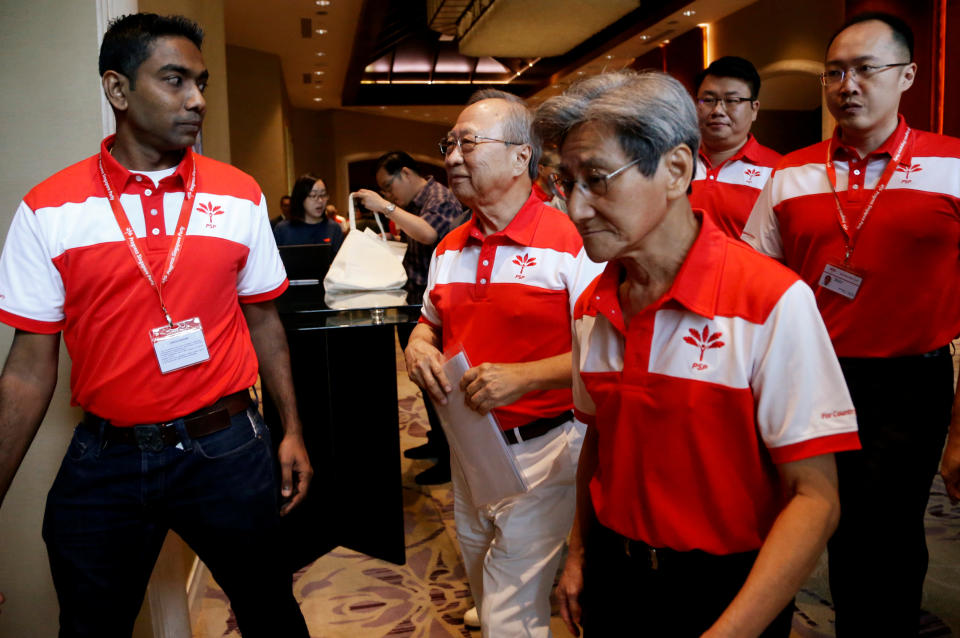COMMENT: Tan Cheng Bock and the Lee Hsien Yang factor

SINGAPORE — In what is likely to be his last shot at active politics, former presidential candidate Tan Cheng Bock went for the jugular.
Aiming his gun at Prime Minister Lee Hsien Loong, the 79-year-old retired doctor known for his cautious, considerate and considered style of politics said at a press conference to launch his Progress Singapore Party (PSP) last Friday (26 July), “As you all know, Temasek is part of our reserves. We want to know how that selection process was made…There must be many of you who were wondering why, for example, the wife of our Prime Minister has been appointed to be the CEO of Temasek.”
It was that rare occasion when he tackled the man rather than the ball. In the process, the good old doctor drew a decisive political marker by kicking the ball into the court of PM Lee and his wife, Ho Ching, and putting the disquiet about her controversial appointment right back onto the political stage.
The big picture back story here is Tan’s use of words like transparency, accountability and independence. Words that the People’s Action Party (PAP) government has touted for its evergreen existence in power since 1959. “I worry because I see the foundations of good governance eroding,’’ he said in a sharp attack on the PM’s rule since 2004.
It was a clear attempt to show that the government is slipping away from the ideals of the founding fathers. And he also took an indirect swipe at Lee’s heir apparent, Heng Swee Keat, when he attacked the eroding trust between the ruler and the ruled. Only days before, Heng had made the issue of trust a central plank of his government.
Pressing concerns

Of course, attacking personalities alone is not going to win votes. Yes, it will have some traction with the educated middle class who see the lavish lifestyle of the elite as something they can never achieve in their lifetime as they struggle to keep their jobs, pay for their 99-year-lease HDB flat, educate their children and save up money for retirement. And for others, their life’s hopelessness is a constant worry.
Tan was asked what his PSP’s plans are for such people. Despite constant urging from some of the journalists, Tan held his cards close to his chest. He is a master at that, having deflected questions about the identities of his full team; hopefully there will be some light shed on the matter during the PSP’s public event on 3 August.
A credible line-up for a new party like his is critical. Many of the faces that were revealed at the press conference have been around for ages, some of them resembling members of a Dad’s Army. With the town council charges hanging over two veterans of the Workers’ Party, many are looking to Tan’s party to create a stir at the polls. And he cannot continue to keep the people guessing.
To be able to realise his dream of creating an alternative party, Tan needs to initiate two more developments.
A loose coalition of major opposition parties that will ensure that three-cornered fights are avoided at the next election. The good old doctor is the only man who can make such a possibility a reality. It is not going to be easy as personality politics and a lack of trust will be the hurdles. While Tan has said such an alliance is in the works, he knows full well that an earlier attempt to get them together achieved nothing.
Will Lee Hsien Yang be a candidate?

Then, there is the Lee Hsien Yang factor. The calculated appearances of the estranged younger brother of the PM at some of Tan’s informal walkabouts on weekends have stirred the ground. Sources close to the 62-year-old say that he will play the role of kingmaker rather than having any aspirations to the throne.
But if Tan can persuade the younger Lee to contest the next general election, that will be a big, firm step forward. His short but significant statement on Sunday endorsing Tan’s party and attacking his brother for moving the PAP away from what the party stood for under his father’s leadership was striking for its clarity and boldness. And it was in step with Tan’s remarks at the press conference.
But the big question remains: Will Lee contest the next election as a candidate? If he does, then Tan’s task of coming up with a solid manifesto and a list of credible candidates will be made that much easier.
P N Balji is a veteran Singaporean journalist who was formerly chief editor of Today, as well as an editor at The New Paper. He is currently a media consultant and author of the best-selling “Reluctant Editor: The Singapore Media as Seen through the Eyes of a Veteran Newspaper Journalist”. The views expressed are his own.
Related stories:
COMMENT: Budget 2019 is unimaginative and all-too familiar
COMMENT: What awaits Tan Cheng Bock?
COMMENT: How Heng Swee Keat can return the favour to PAP cadres



